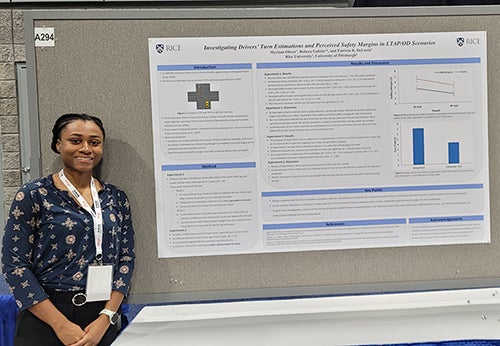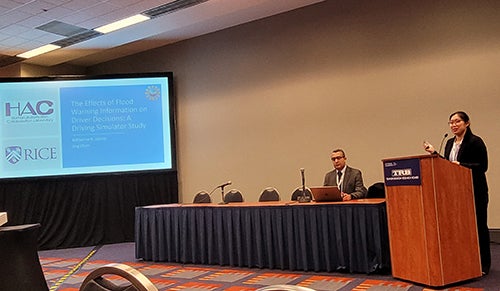Katie Garcia and Myriam Oliver, PhD students in Human-Computer Interaction and Human Factors (HCI/HF), were recently awarded the 2025 Dwight David Eisenhower Transportation Fellowship. Funded by the Federal Highway Administration, the highly selective fellowship is granted annually to graduate students performing transportation-related research. Fellows represent a wide range of fields, including HCI/HF, engineering, environmental science, data analysis, and statistics, among others.
Third-year graduate student Oliver applied to Rice after participating in a summer Research Experience for Undergraduates (REU) led by Pat DeLucia, School of Social Sciences associate dean for research and professor of psychological sciences. In her research, Oliver primarily focuses on human perception in the transportation domain and understanding how people estimate when a vehicle may reach them.

“The importance of this type of research is evidenced in various situations, such as when someone is making a left turn or crossing the street,” said Oliver. “They need to estimate how much time they have before a vehicle reaches them to determine if it is safe to proceed.”
Previously a graduate student at Old Dominion University, Garcia joined her advisor, Jing Chen, associate professor of psychological sciences, and transferred to Rice. Having studied at Rice as an undergraduate, she was happy to move back closer to family and return to her old stomping grounds. Garcia, also a third-year graduate student, focuses her research on driver decisions during floods, explainable artificial intelligence in transportation, and the human perspective side of cybersecurity.
“My primary research explores factors that affect driver decisions when roadways are flooded,” said Garcia. “Flash floods happen quickly, and many people attempt to drive through flooded roadways. We want to provide solutions to help people successfully navigate these dangerous situations.”
The application for the fellowship, Garcia and Oliver noted, included a research proposal for the research they would present at the Transportation Research Board (TRB) Annual Meeting. In addition to supporting student research, the year-long award assists with travel to the TRB meeting.
This year’s TRB meeting took place on January 5-9 in Washington, D.C. During a poster session for Eisenhower Fellows, Garcia presented Leveraging User-Centered Explainable Artificial Intelligence Toward Transparent Transportation, and Oliver presented Investigating Drivers’ Turn Estimations and Perceived Safety Margins in Left Turn Across Path/Opposite Direction Scenarios. Garcia also discussed her research, The Effects of Flood Warning Information on Driver Decisions: A Driving Simulator Study, during a session on human factors related to infrastructure operations and design.

“The Eisenhower Fellowship is a tremendous honor for these students,” said DeLucia. “It gives them the opportunity to present in front of their peers at the TRB meeting and network with professionals in the field of transportation. The field of HCI/HF plays a key role in the improvement of traffic safety, and the Fellowship helps advance this area.”
In addition to presenting their research, Garcia and Oliver attended workshops, roundtable discussions, lectures, committee meetings, a career fair, and an exhibit hall that featured innovative transportation simulations. The two students took advantage of the wide array of offerings at the TRB meeting, which support their future career goals.
“I would like to continue conducting human factors transportation research, ideally for the government,” said Oliver. “I believe that you can make a substantial impact working with state entities that are genuinely interested and want recommendations on infrastructure or policy changes that should be implemented.”
Garcia can also envision a career in government.
“I am leaning toward either government or industry right now,” said Garcia. “I may work with transportation, artificial intelligence, cybersecurity – anything related to human factors. I plan to keep conducting research that may be published, allowing for the possibility to eventually transition back to academia, should the opportunity arise. The field of HCI/HF supports a range of possibilities.”
Housed within the School of Social Sciences’ Department of Psychological Sciences, the HCI/HF Program at Rice University is one of only 20 programs that is fully accredited by the Human Factors and Ergonomics Society. For more information, visit the HCI/HF Program page.
